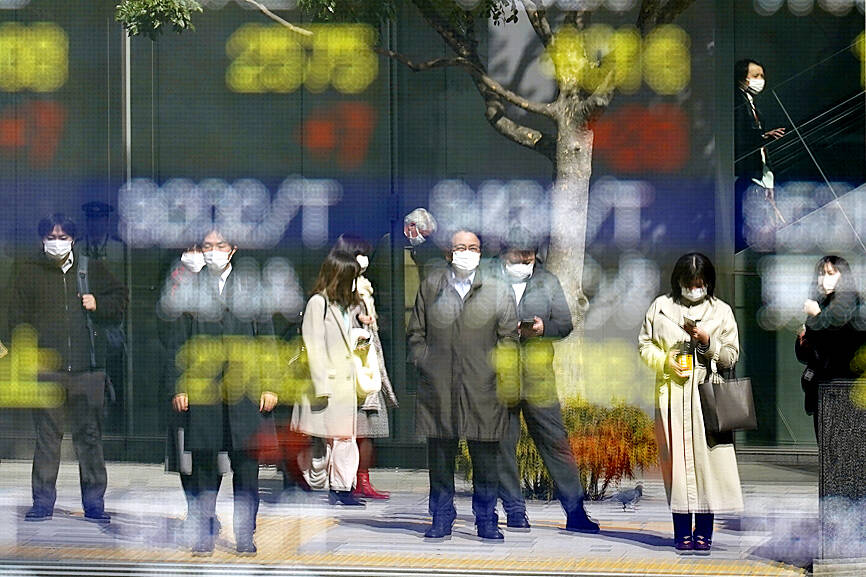Asian stock markets on Friday followed Wall Street higher after a US Federal Reserve official raised hopes the US central bank might not step up its anti-inflation fight as much as feared.
Taipei, Hong Kong, Shanghai, Sydney and Tokyo advanced.
Wall Street on Thursday rose for the first time in three days after Atlanta Fed President Raphael Bostic expressed support for raising the Fed’s key lending rate less than many investors had been forecasting.

Photo: AP
Bostic said that the Fed might be able to suspend additional rate increases by mid-year, sooner than some expect.
He said he supported raising the Fed’s benchmark lending rate to a range of 5 to 5.25 percent.
That countered comments by other Fed officials who say rates might have to be raised more and stay elevated longer to extinguish inflation after job growth, consumer spending and price increases were stronger than expected.
Stocks advanced following those “dovish comments,” Anderson Alves of ActivTrades said in a report.
In Taipei, the TAIEX on Friday closed up 9.7 points, or 0.06 percent, at 15,608.42, up 0.67 percent from a week earlier.
The Shanghai Composite Index rose 17.74 points, or 0.5 percent, to close at 3,328.39, up 1.87 percent for the week, after a central bank official said that China’s vast real-estate industry was recovering from a slump triggered by debt controls that led to a wave of defaults by developers, rattling global financial markets.
People’s Bank of China Deputy Governor Pan Gongsheng (潘功勝) mentioned Evergrande Group, the global real-estate industry’s most heavily indebted developer, but he gave no update on government-supervised efforts to restructure its US$310 billion in debt.
China is today to begin its annual legislative session, where leaders are expected to affirm policies meant to spur economic growth after a slowdown worsened by COVID-19.
The Nikkei 225 in Tokyo gained 1.6 percent to 27,934.01 after Japan’s unemployment rate edged lower in January. It was up 1.73 percent weekly. The broader TOPIX gained 1.25 percent to 2,019.52, rising 1.57 percent from the previous week.
The KOSPI in Seoul gained less than 0.17 percent to 2,432.07, up 0.35 percent weekly, while the Hang Seng in Hong Kong gained 0.68 percent to 20,567.54, up 2.79 percent from last week.
Sydney’s S&P/ASX 200 added 28.2 points, or 0.39 percent, to 7,283.6, down 0.32 percent for the week, while India’s SENSEX rose 1.53 percent to 59,808.97, rising 0.58 percent weekly.
Bostic’s remark countered comments by other Fed officials who said rates might have to be raised more and stay elevated longer to extinguish stubborn inflation after job growth, consumer spending and price rises were stronger than expected.
Data on Thursday showed that fewer Americans applied for unemployment benefits last week despite interest rate hikes to cool business activity. That is positive for workers, but the Fed said it worries strong employment might fuel inflation.
Additional reporting by staff writer, with CNA

TAKING STOCK: A Taiwanese cookware firm in Vietnam urged customers to assess inventory or place orders early so shipments can reach the US while tariffs are paused Taiwanese businesses in Vietnam are exploring alternatives after the White House imposed a 46 percent import duty on Vietnamese goods, following US President Donald Trump’s announcement of “reciprocal” tariffs on the US’ trading partners. Lo Shih-liang (羅世良), chairman of Brico Industry Co (裕茂工業), a Taiwanese company that manufactures cast iron cookware and stove components in Vietnam, said that more than 40 percent of his business was tied to the US market, describing the constant US policy shifts as an emotional roller coaster. “I work during the day and stay up all night watching the news. I’ve been following US news until 3am

UNCERTAINTY: Innolux activated a stringent supply chain management mechanism, as it did during the COVID-19 pandemic, to ensure optimal inventory levels for customers Flat-panel display makers AUO Corp (友達) and Innolux Corp (群創) yesterday said that about 12 to 20 percent of their display business is at risk of potential US tariffs and that they would relocate production or shipment destinations to mitigate the levies’ effects. US tariffs would have a direct impact of US$200 million on AUO’s revenue, company chairman Paul Peng (彭雙浪) told reporters on the sidelines of the Touch Taiwan trade show in Taipei yesterday. That would make up about 12 percent of the company’s overall revenue. To cope with the tariff uncertainty, AUO plans to allocate its production to manufacturing facilities in

Six years ago, LVMH’s billionaire CEO Bernard Arnault and US President Donald Trump cut the blue ribbon on a factory in rural Texas that would make designer handbags for Louis Vuitton, one of the world’s best-known luxury brands. However, since the high-profile opening, the factory has faced a host of problems limiting production, 11 former Louis Vuitton employees said. The site has consistently ranked among the worst-performing for Louis Vuitton globally, “significantly” underperforming other facilities, said three former Louis Vuitton workers and a senior industry source, who cited internal rankings shared with staff. The plant’s problems — which have not

COLLABORATION: Given Taiwan’s key position in global supply chains, the US firm is discussing strategies with local partners and clients to deal with global uncertainties Advanced Micro Devices Inc (AMD) yesterday said it is meeting with local ecosystem partners, including Taiwan Semiconductor Manufacturing Co (TSMC, 台積電), to discuss strategies, including long-term manufacturing, to navigate uncertainties such as US tariffs, as Taiwan occupies an important position in global supply chains. AMD chief executive officer Lisa Su (蘇姿丰) told reporters that Taiwan is an important part of the chip designer’s ecosystem and she is discussing with partners and customers in Taiwan to forge strong collaborations on different areas during this critical period. AMD has just become the first artificial-intelligence (AI) server chip customer of TSMC to utilize its advanced